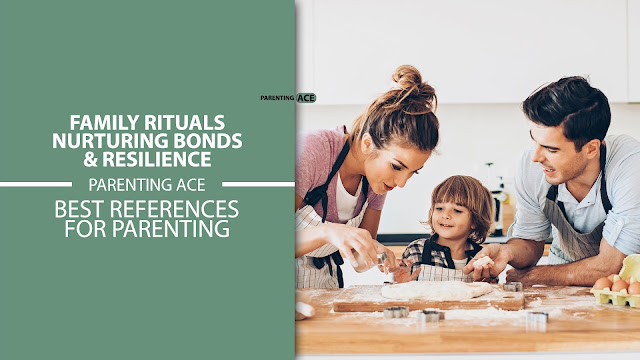The Importance of Family Rituals and Traditions: Nurturing Bonds and Building Resilience
Family rituals hold a timeless significance in our lives, transcending mere routines to become cherished traditions that shape our familial identity and collective experiences. In this blog post, we embark on a journey to explore the profound impact of family rituals and traditions on our emotional connections, resilience, and sense of belonging within the family unit. From simple daily routines to elaborate cultural celebrations, these rituals serve as the glue that binds us together, fostering lasting memories and strengthening the bonds that define us as a family. Join us as we delve into the heartwarming world of family rituals, where every gesture, every tradition, carries with it the power to nurture love, resilience, and cherished moments that endure through generations.
 |
| Family Rituals: Nurturing Bonds & Resilience |
What Are The Benefits Of Establishing Family Rituals And Traditions?
Family rituals and traditions play a crucial role in shaping the dynamics and identity of a family unit. These practices, whether simple or elaborate, hold significant meaning and impact on family members' well-being and relationships. In this article, we delve into the profound benefits of establishing and maintaining family rituals and traditions, exploring how they contribute to emotional connection, resilience, and a sense of belonging within the family.
Benefits of Establishing Family Rituals and Traditions
1. Creating a Sense of Belonging: Family rituals and traditions foster a sense of belonging and identity within the family. Whether it's a weekly game night, a yearly vacation, or celebrating cultural holidays, these shared experiences strengthen familial bonds and create a feeling of unity among family members. Such rituals provide a framework for understanding one's place within the family and instill a sense of security and support.
2. Promoting Emotional Connection: Regular engagement in family rituals encourages open communication and emotional connection among family members. By coming together to participate in activities such as sharing stories, expressing gratitude, or reflecting on shared experiences, family members deepen their understanding of each other's thoughts, feelings, and values. This emotional connection fosters empathy, trust, and intimacy, laying the foundation for healthy relationships within the family.
3. Building Resilience: Family rituals and traditions provide a sense of stability and predictability in the face of life's challenges. During times of stress or upheaval, the continuity of familiar rituals can offer comfort and reassurance to family members, helping them navigate adversity with resilience and strength. These rituals serve as anchors, reminding family members of their collective strength and ability to support one another through difficult times.
4. Passing Down Values and Cultural Heritage: Family rituals and traditions serve as vehicles for transmitting values, beliefs, and cultural heritage from one generation to the next. Whether it's observing religious ceremonies, celebrating cultural festivals, or practicing customs unique to the family, these rituals reinforce family identity and preserve important aspects of cultural heritage. Through active participation in these traditions, children learn about their family's values and history, fostering a sense of pride and connection to their cultural roots.
5. Creating Lasting Memories: Family rituals and traditions create opportunities for shared experiences and cherished memories that last a lifetime. Whether it's baking cookies together during the holidays, taking annual family photos, or embarking on yearly traditions, these rituals create a sense of continuity and nostalgia that binds family members together across time. These shared memories become a source of comfort and joy, strengthening the emotional bonds between family members.
In conclusion, family rituals and traditions are more than just repetitive actions or ceremonies; they are the threads that weave together the fabric of family life. By establishing and maintaining these rituals, families can nurture emotional connection, resilience, and a sense of belonging among family members. Whether it's through shared activities, cultural celebrations, or simple daily routines, family rituals and traditions play a vital role in shaping the identity and well-being of the family unit, creating lasting bonds that withstand the test of time.




